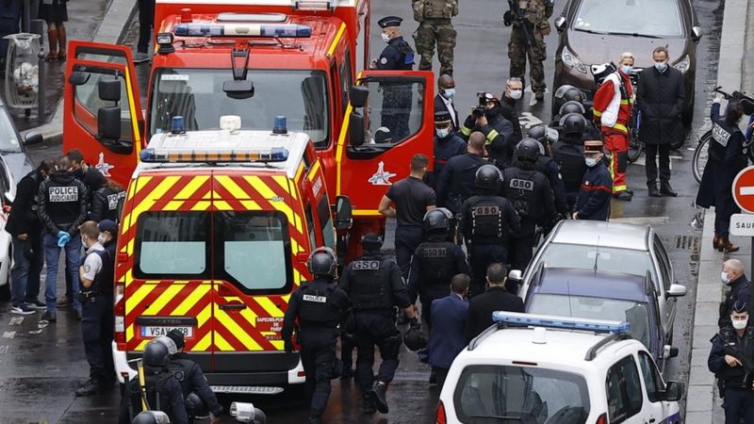Seven people have been detained in connection with an attack outside the former offices of satirical magazine Charlie Hebdo in Paris, officials say.
A man armed with a meat cleaver wounded two people in the attack on Friday. The main suspect, identified as an 18-year-old man of Pakistani origin, was arrested near the scene.
Police said six others were in custody and being questioned. The attack is being treated as a terrorist incident. Interior Minister Gérald Darmanin said it was "clearly an act of Islamist terrorism". He said police had underestimated the threat level in the area.
The attack came as a high-profile trial was under way of 14 people accused of helping two jihadists carry out the 2015 attack on Charlie Hebdo, in which 12 people were killed.
Charlie Hebdo vacated its offices after the 2015 attack, and the building is now used by a television production company.
The two victims of Friday's attack have not been officially named but police said they were a man and woman who worked at the production company. Prime Minister Jean Castex told reporters at the scene - near Boulevard Richard-Lenoir - that their lives were not in danger.
Charlie Hebdo is now run from a secret location.
What do officials say happened?
In an interview with state broadcaster France 2 late on Friday, Mr Darmanin described the stabbing as "a new bloody attack against our country, against journalists".
"It's the street where Charlie Hebdo used to be. This is the way the Islamist terrorists operate," the interior minister said.
He said he had ordered security to be stepped up around synagogues this weekend for Yom Kippur, the holiest day in the Jewish calendar.
The main suspect has not been named, but Mr Darmanin said he arrived in the country three years ago "as an isolated minor" of Pakistani nationality.
The minister added that the suspect was not known for being radicalised, but had a previous arrest for carrying a screwdriver - and gave no details.
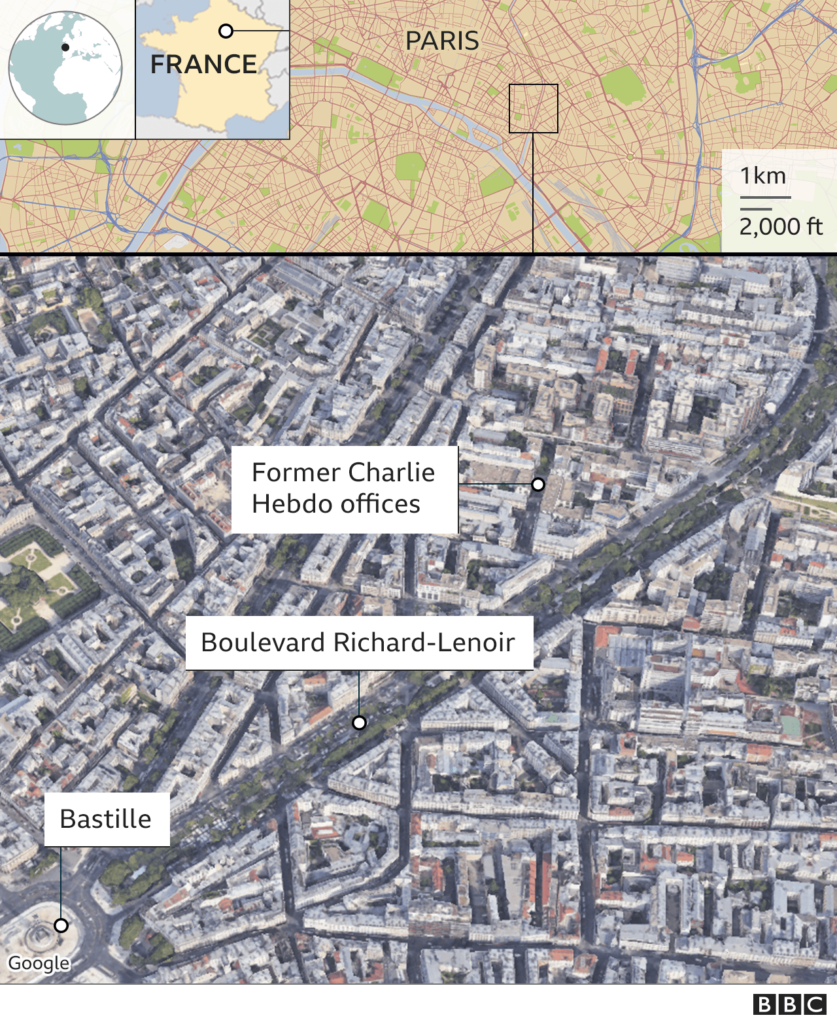
How did the attack unfold?
Colleagues of the victims said they had been outside the Premieres Lignes news production agency smoking a cigarette when they were attacked.
The firm has offices Rue Nicolas Appert, a street off Boulevard Richard-Lenoir where Charlie Hebdo's offices used to be located. A mural honouring those killed in the January 2015 attack is nearby.
"I went to the window and saw a colleague, bloodied, being chased by a man with a machete," one employee, who asked not to be named, said.
"They were both very badly wounded," Paul Moreira, the founder and co-head of Premieres Lignes, told AFP news agency.
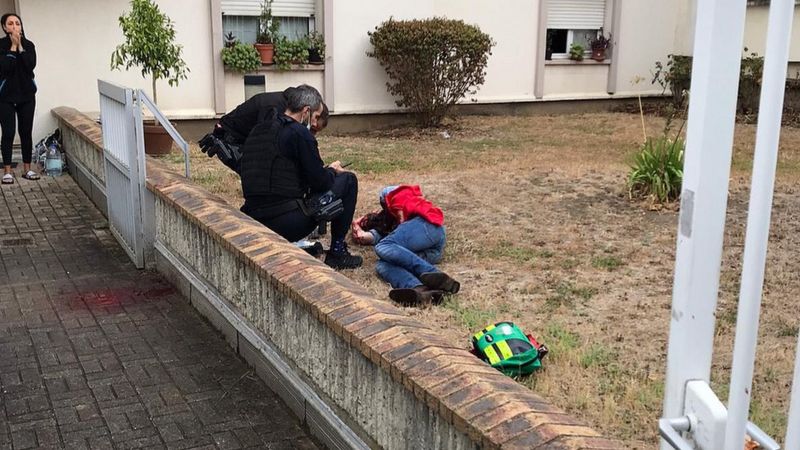
Police quickly sealed off the area and a blade - described as a machete or a meat cleaver - was recovered nearby.
The main suspect was arrested on the nearby Place de la Bastille. Shortly afterwards a 33-year-old Algerian national was also taken into custody over possible links to the attack.
Five others - born between 1983 and 1996 and said to be of Pakistani origin - were later detained during the search of property north of Paris believed to be the home of the main suspect, officials say.
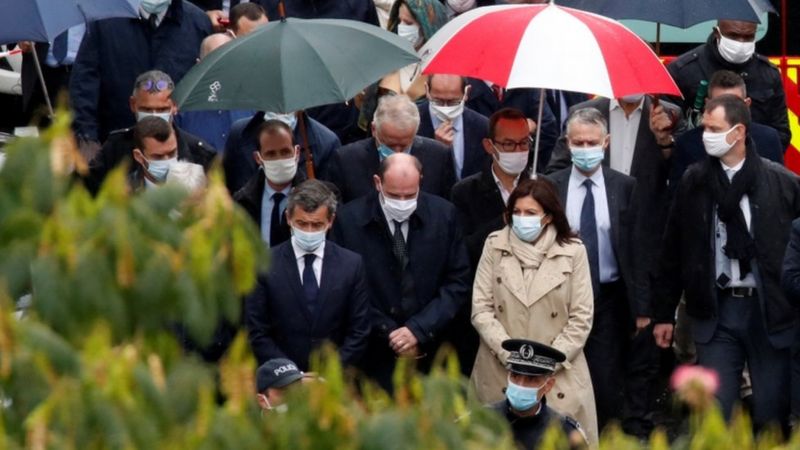
In a tweet, Charlie Hebdo expressed its "support and solidarity with its former neighbours... and the people affected by this odious attack".
What about the new trial?
Charlie Hebdo marked the start of the trial earlier this month by reprinting its controversial cartoons of the Prophet Muhammad.
The original cartoons had sparked anger and protests in several Muslim majority countries.
In response to the reprinting, the militant group al-Qaeda - which claimed the 2015 attack - renewed its threat against the magazine.
The magazine's head of human resources said earlier this week that she had moved out of her home after receiving death threats.
The defendants are also accused of helping another jihadist carry out related attacks, killing four people.
The 17 victims were killed over a period of three days. All three attackers were killed by police. The killings marked the beginning of a wave of jihadist attacks across France that left more than 250 people dead.
What happened in 2015?
On 7 January that year, two French Muslim gunmen - brothers Chérif and Saïd Kouachi - stormed the Charlie Hebdo offices Rue Nicolas-Appert before opening fire on its staff.
The editor, Stéphane Charbonnier, better known as Charb, was among four celebrated cartoonists who were killed.
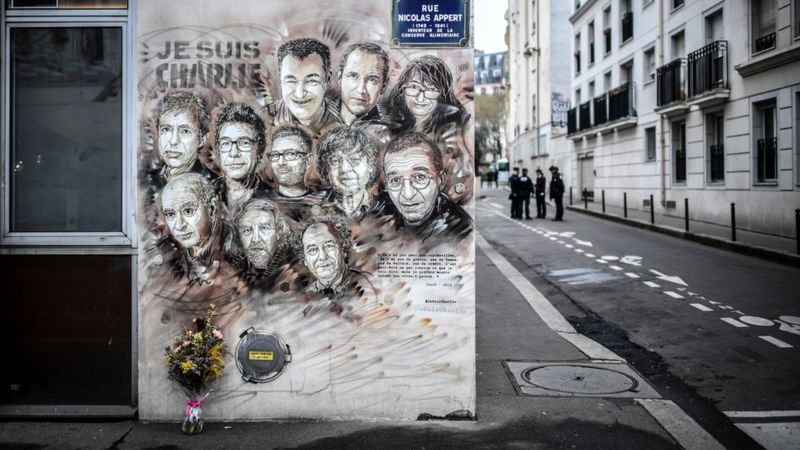
The gunmen were eventually killed by security forces after a manhunt. Their victims were eight journalists, two police officers, a caretaker and a visitor.
In a related attack just days later, jihadist gunman Amedy Coulibaly killed three customers and an employee in a hostage siege at the Hyper Cacher Jewish supermarket in the east of Paris.
He had earlier shot dead a policewoman in the city. Security forces eventually stormed the supermarket before killing him and freeing the remaining hostages.
Latest Stories
-
30 suspects arrested as IGP orders raids on galamsey hotspots in 3 regions
37 minutes -
BlowChem announces price reductions on beverages, effective June 1
2 hours -
When lawmakers themselves appear unwilling to abide by the laws they legislate
5 hours -
Mahama promises 200,000-hectare cocoa expansion to revitalise industry
5 hours -
Communications Minister unveils gov’t’s digital inclusion plan for PWDs
6 hours -
Youth group accuses judiciary of undermining anti-corruption efforts
6 hours -
Parliament recommends ratification of WTO agreement on fisheries subsidies
6 hours -
Ghana to roll out Labour Export Initiative – Mahama announces
6 hours -
Two killed in fatal accident on Bole–Damongo Road
6 hours -
Joseph Ade Coker, former NDC Greater Accra Regional Chairman dies
6 hours -
From Bulldozing to Bail-Begging: Wontumi’s Plot Twist No One Saw Coming
6 hours -
Mahama promises new modern regional hospital for Ahafo Region
7 hours -
Appiagyei-Atua: Protest by Minority over Wontumi’s arrest unnecessary and theatrical
7 hours -
Parliament approves GH¢10bn for NHIA
7 hours -
Martin Kpebu alleges some NPP bigwigs exploiting Wontumi’s arrest for political gain
7 hours

